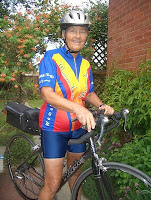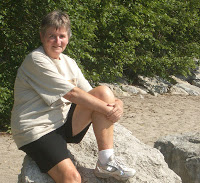My cycling adventure, an amazing trip across the country in 2005, has given me endless material for story time. Once again I call on my journal to remind me of the many places we found ourselves leaving and the experiences which followed the many “leavings” that took place. Leaving Dog Beach in San Diego, the tour’s place of origin, was by far the most exciting departure from anywhere that I can recall ever making. Reading from my journal: “Saturday, March 20: The first day we left from Dog Beach. We dipped our tires in the Pacific Ocean, rode out of San Diego and started up the coastal range. This was a 33 mile ride. It was a day of city traffic and then climbing. We climbed almost 2000 feet.” There are a couple of places where it was too steep for me to ride, so I had to walk, pushing my bike. This was the first of many such walks on this trip. Cycling clip-in shoes are not designed for walking. They have metal devises installed on the soles that clip into devises on the pedals. Once on the bike, shoes clipped to pedals, one is not stuck in this clipped-in position as a quick flick of the ankle releases you from the pedals. It turns out this is ever so handy when you come to a stop and have to put your foot on the ground.
Back to the journal: “Glenda, who is our oldest member—I thought I was the oldest—Glenda didn’t want anyone to know how old she was. She disclosed her secret to the Fox News people when they were interviewing us at the start of the trip on Dog Beach. Fox News is a bad choice when revealing something you don’t want anyone else to know. I guess she couldn’t resist the notoriety of being the most …whatever.” I remember how cold I was when we arrived at our first night’s stop—a place called Alpine, CA. Our accommodations provided a Jacuzzi which was most welcome. Another memorable departure on that cycling adventure happened a couple of weeks into the trip.
It was Sunday morning, April 3rd. We had been instructed the night before by our leader Susan as follows: “Now ladies, I know we are all tired having just completed a 90 mile ride today. But I want you to be alert enough to remember to turn your clocks back one hour as we switch to day light saving time at midnight. Now be sure to get up an hour early because we will lose an hour tomorrow. We have a long ride and i want everyone in before dark.” Yawning and stretching we all promised we would get with the correct time. We obediently turned our clocks back before going to sleep. Up an hour early in the morning and it’s pitch dark. Now breakfast is over and it’s time to saddle up and leave. We never leave in the dark. But we know we must because our leader told us we would lose an hour today so dark or not, we better get on the road. We LOSE an hour today. Let’s get going. Wait, a couple of the women have tires that went flat over night. That creates a serious delay for several of us. We need about 5 women to hold flashlights while four women fix the two flats. We’re finally leaving and it’s still dark.
It was about mid-morning coffee time, at the first SAG stop. After a few sips of the beloved beverage, it dawned on just about everyone at the same time: we actually gain an hour today. This is spring. Spring forward, right. We were supposed to turn our clocks forward an hour. We could have stayed in bed an extra hour. Where is leader Susan? I want to kill her. Moral of that story. Just because you are paying your leader to direct you, doesn’t mean you turn off your brain completely. We rode across 8 different states. That meant leaving California, New Mexico, Arizona, Texas, Louisiana, Alabama, Mississippi on our bicycles. I clearly remember celebrating our entry into a new state at the end of the day with drinks at dinner. Except for the state’s welcome sign on the road, leaving one state and entering another was more of the same: pedal, pedal, pedal. But it was exciting and satisfying to be able to mark our progress with a huge sign on the road as we rode out of Texas: “Welcome to Louisiana.” This was especially true after pedaling for nearly three weeks as we journeyed through the endless countryside. We thought Texas would never end. Texas was full of exciting encounters, however. First there was the border patrol outside of El Paso. We cyclist were not suspect, but Bo Peep our SAG wagon was stopped and searched. The search took a long time, too. That vehicle was full of supplies. Fortunately nothing suspicious. In Texas we encountered every kind of terrain and environmental condition known to man: mountain passes, magnificent wildflowers, dessert flat, wind, rain , heat, cold, cities, wide open roads with nothing in sight except fields and more road. The scenic terrain of the Texas Hill Country may not have been the longest or highest in elevation, but those hills were definitely the steepest. One thing that remained the same throughout the state of Texas was the rough surface of the roads. This I found to be very annoying and hard on my aging joints. “Chip-seal” they called it. I called it cheap road surface. For this one reason I was thrilled when we arrived at our last Texas stop. Tomorrow we would leave Texas. We were at our Super 8 Motel in a small town in East Texas having our usual evening map meeting to prepare for the next day’s ride. We were told by Susan to be alert when riding in Louisiana, the state we would enter tomorrow just after crossing the Sabine River. “ Louisiana has lots of dogs,” she warned—“loose dogs.
There are no laws requiring people to keep their dogs under control in Louisiana. They love to run out at you and nip at your ankles.” “Oh dear,” I thought. “I think maybe I’ll bargain for more rough road in preference to loose, angry dogs. “Just look them in the eye and firmly yell ‘NO.” was Susan’s advise. Our leader’s counsel did nothing to ease my anxiety at the time, but I found on the couple of occasions when the foreseen event actually took place, the firm ‘no’ worked.
Leaving Texas felt good that time. A few weeks later leaving the Florida panhandle and approaching the Atlantic coast felt different. It was bittersweet. We were all aware this adventure was coming to an end. At this point in Florida I was having trouble focusing on anything other than pushing my pedals. Again from my journal: “It hasn’t fully registered in my head the fact that we have just ridden across the country 3165 miles. I expect it will sink in at some point, or maybe not. It’s a bit overwhelming. No question about it, it was the trip of a lifetime and a most extraordinary experience and a most extraordinary group of people.” Over the 58 days we made 52 departures from locations across eight different states. On those early morning departures, I was never more motivated to leave a place and so totally focused on arriving at the next place. I’m glad I have the day to day journal of the trip. I’m also grateful for the occasional appropriate story time topic to push me to get out the journal and relive some of the magical moments.
© 7 November 2016
About the Author
Betsy has been active in the GLBT community including PFLAG, the Denver Women’s Chorus, OLOC (Old Lesbians Organizing for Change), and the GLBT Community Center. She has been retired from the human services field for 20 years. Since her retirement, her major activities have included tennis, camping, traveling, teaching skiing as a volunteer instructor with the National Sports Center for the Disabled, reading, writing, and learning. Betsy came out as a lesbian after 25 years of marriage. She has a close relationship with her three children and four grandchildren. Betsy says her greatest and most meaningful enjoyment comes from sharing her life with her partner of 30 years, Gillian Edwards.







